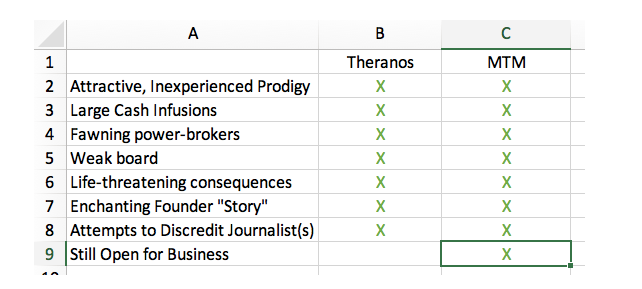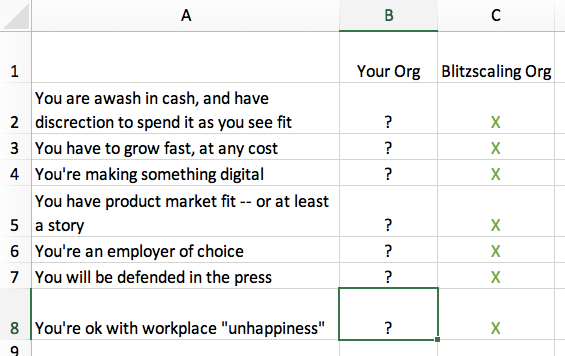Pattern Recognition, Members Only #5

Let’s talk about the next tech-vaunted book I don’t want to read. And the last one I didn’t, which I’m reading now.
I’m 50 pages into the Andy Grove book; maybe I should be live-tweeting it.
It opens with lessons I learned in bschool Ops classes: when making breakfast at scale, how do you optimize toast/egg preparation so that you will predictably deliver them as a single meal?
You’re trying to figure out your production limits.
Today in tech, most aren’t making chips. We’re making digital things, from digital things. Everything we produce is potentially infinite.
Our biggest limiting factor isn’t skilled people who build things. Or even the money to pay them. It’s the staff, process, and tools to reliably hire and onboard the builders.
(Let me not stop right now to discuss the fact that this actually makes HR the most important function in our organizations. I’ll come back to that another day.)
So, I am still at a loss for why Andy Grove’s High Output Management is a good book for us today. I’ll keep reading.
Another book came out this week. Reid Hoffman’s Blitzscaling.
Hoffman has been blitzing the business media with his launch, telling people to “embrace chaos” and such. So, many will hear bytes on blitzscaling.
Before laying out the time to read the book — though I will — I’m wondering, what can be gleaned from what Hoffman has put out there already?
Like this 2016 HBR interview, about businesses that “must” grow quickly to cement market dominance.
Here’s one thing.
Almost every blitzscaling org that I have seen up close has a lot of internal unhappiness. Fuzziness about roles and responsibilities, unhappiness about the lack of a clearly defined sandbox to operate in. “Oh my God, it’s chaos, this place is a mess.” The thing that keeps these companies together—whether it’s PayPal, Google, eBay, Facebook, LinkedIn, or Twitter—is the sense of excitement about what’s happening and the vision of a great future. Because I’m part of a team that’s doing something big, I’ll work through my local unhappiness. Sure, I’d like a tidier sandbox, I’d like to be more efficient, I’d like the organization to be run more smoothly. But I’m willing to let it go because the pain will be worth it.
Um, ok.

Let’s return to Andy Grove’s world of production limits. Blitzscaling burns cash. So you’d optimize around factors that bring you more investment capital.
You can generate this yourself, with revenue. Or, you need professional investors.
So you need to optimize your compelling story.
Indeed, “storytelling” has been buzzwordy in business for a few years. Maybe you’ve done a fun storytelling workshop at an offsite.
Storytelling fulfils some of our most primal human needs. It’s a great way to teach, and learn. It’s why I love Movies About Work, and illustrating business principles with non-business books.
As long as we know whether a story is fiction or not, and how we’re using it, storytelling is awesome.
Once we let go of the facts, or have a blurry intention, storytelling can be used towards unfortunate and bad ends.
Unprotected is a chilling account of a US-based not-for-profit established to create schools for girls in Liberia, called More than Me.
An attractive, inexperienced founder risks it all to raise funding for her world-changing idea.
Her compelling personal story attracted funding and name power-brokers. The organization attempted to discredit people who raised problems, and pesky journalists. A weak, uninformed board failed to act suitably.
People have been hurt, and lives lost.
Sound familiar? In Issue 29, I wrote about John Carreyrou’s Bad Blood, on Theranos.
Here’s my chart comparing Theranos and More than Me (MTM.)

What do you do when you’re the leader of an organization, and people report problems? Or when you’re a board member hearing about management failures?
What if it’s a blitzscaling organization?
You fix the things that will get investors to give you more cash.
So maybe you fix your story. (Internally, maybe you ramp up the missionwashing.)
Of course, Fix Your Story is also the strategy that sustains a Ponzi scheme. But I digress.
More practically speaking, can blitzscaling be okay? And will reading about it benefit you or your organization?
Kids, if you try this at home, will it work like it did on TV?

(Excel 4EVAH.)
Here’s a story I hold in my mind. Several years back, a respected, senior mid-career designer told me that she was tired of working for more inexperienced managers. Sometimes she just wanted to quit.
“If I have to work for one more manager who walks into the office, waving a Medium post about a new management theory they want to implement…”
People will read Blitzscaling. Some will come into the office, ready to implement.
Some people at big companies love to try things that will make them “more like a startup.” Blitzscaling will fail spectacularly in large companies, for so many reasons. The major consequences will involve people’s relationships and careers.
In smaller organizations? Well I’m imagining both Theranos and More than Me as failures at blitzscaling.
A point, and a question
When I started On Management, I thought I’d cull what people could read about running a business, so that they’d only read the good stuff.
Today, I think it’s probably more important to point out some of the downsides of the loud and pervasive voices.
I mean.
How did you settle on the term “blitzscaling”? It has some interesting associations.
I have obvious hesitations about the World War II association with the term “blitzkrieg.” However, the intellectual parallels are so close that it is very informative.
Blitzscaling, HBR, April 2016
Reading far and wide is how we develop a radar for what’s good and what isn’t.
How can we be sure that we’re developing the people on our teams who can separate the signal from the noise?
My hypothesis is that we’d do well to prioritize discussing (business) literature/media focused on how to manage human relationships, and treat people (well) at work.
What do you think we should be doing?
Some of tech media is garbage, and even people who want to be allies might not retain the whole story
Earlier this week, I responded to a tweet from someone I tend to see as an ally of under-represented people in tech — though I don’t know him.
He tweeted about a comeback story of founder who was booted from his company.
I tweeted back that the Comeback Founder’s original company dominates results when you search “condoms, stairwells.”
I appreciate the nod to “fortune” as a forgetting-enabling factor.
(Maybe this kind of forgetting partly explains why objectively awful companies get propped up.)
Others aren’t fortunate.
In cultures where condoms and stairwells go together, we who can’t forget will be subject to various risks.
Also, tech media that’s reprinting what’s basically a press-release to a dude’s comeback? That’s not journalism, or reporting. It’s a clickbait farm.
This Comeback Kid also recently completed, wait for it, Y Combinator? (Which brought XX Combinator to mind.)
Also, this guy’s mission is to “kill” HR.
Maybe he’s blitzscaling.
Endorse
Links
- Brittany Laughlin wrote her Startup Maturity Framework in 2014. It was the first articulation I had seen of company development for our current-era tech/startup community. (The 2016 Reid Hoffman HBR interview contained a resonant framework.)
- Most companies won’t have cash to sustain blitzscaling, even if it is a valid thing. Only a few thousand companies are raising money in US VC markets, per PwC / CB Insights MoneyTree™ Report (Q3 2018).
- Blitzscale away, gents. “Mr. Dubugras and Mr. Franceschi thought there were ways to judge creditworthiness that looked at metrics more meaningful to young tech companies, such as the caliber of their venture-capital backers.” The College Dropouts Who Rode Credit Cards Into The Billion-Dollar Startup Club (paywalled, WSJ)
- “An acclaimed American charity said it was saving some of the world’s most vulnerable girls from sexual exploitation. But from the very beginning, girls were being raped.” It’s painful and potentially triggering. Finlay Young and Kathleen Flynn’s Unprotected, at ProPublica, co-published with Time magazine.
Office Hours, AMAs and so forth
- Office Hours are on October 25.
- Got performance reviews? This quarter, I’m offering team AMAs. Your AMA can cover a topic (reviews) or be more general, and will be delivered by video call.
In my experience, your team’s questions illuminate gaps between what you think you’ve communicated, and what your people managers have actually heard and absorbed. This is gold. I’ll talk with you after the AMA to discuss key themes.
Thank you for subscribing, for reading, and for joining me in my work.
I am designing these missives for you, even the rants. Your feedback is gold. I’d love to hear any thoughts about what is useful and helpful to you here.
Anne Libby
P.S. This is the Members Only edition that you’ve paid to receive. I don’t mind you sharing these editions occasionally with like-minded friends who’d benefit from reading. If you read something here that you’d like to share more widely, please do give me a shout.
ICYMI, the last 3 newsletters…
- Slowness, Speed and Structure: On Management #31, September 30, 2018
- (Mal)-Adaptive Noise Cancellation, Members Only #4.5, September 26, 2018
- Everything Has Changed. Members Only #4, September 9, 2018





